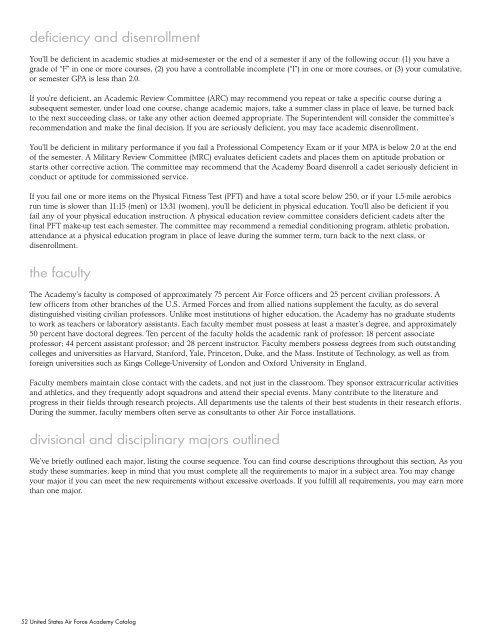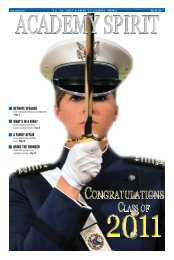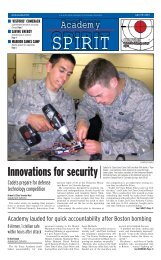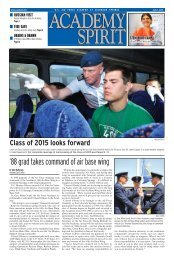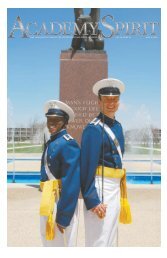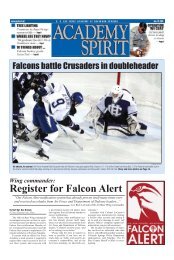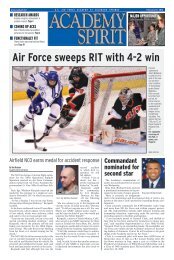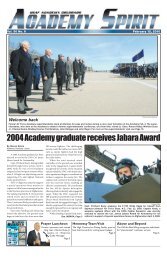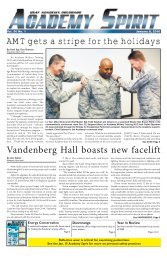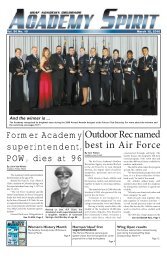2008-2009 Catalog - United States Air Force Academy
2008-2009 Catalog - United States Air Force Academy
2008-2009 Catalog - United States Air Force Academy
You also want an ePaper? Increase the reach of your titles
YUMPU automatically turns print PDFs into web optimized ePapers that Google loves.
deficiency and disenrollment<br />
You’ll be deficient in academic studies at mid-semester or the end of a semester if any of the following occur: (1) you have a<br />
grade of “F” in one or more courses, (2) you have a controllable incomplete (“I”) in one or more courses, or (3) your cumulative,<br />
or semester GPA is less than 2.0.<br />
If you’re deficient, an Academic Review Committee (ARC) may recommend you repeat or take a specific course during a<br />
subsequent semester, under load one course, change academic majors, take a summer class in place of leave, be turned back<br />
to the next succeeding class, or take any other action deemed appropriate. The Superintendent will consider the committee’s<br />
recommendation and make the final decision. If you are seriously deficient, you may face academic disenrollment.<br />
You’ll be deficient in military performance if you fail a Professional Competency Exam or if your MPA is below 2.0 at the end<br />
of the semester. A Military Review Committee (MRC) evaluates deficient cadets and places them on aptitude probation or<br />
starts other corrective action. The committee may recommend that the <strong>Academy</strong> Board disenroll a cadet seriously deficient in<br />
conduct or aptitude for commissioned service.<br />
If you fail one or more items on the Physical Fitness Test (PFT) and have a total score below 250, or if your 1.5-mile aerobics<br />
run time is slower than 11:15 (men) or 13:31 (women), you’ll be deficient in physical education. You’ll also be deficient if you<br />
fail any of your physical education instruction. A physical education review committee considers deficient cadets after the<br />
final PFT make-up test each semester. The committee may recommend a remedial conditioning program, athletic probation,<br />
attendance at a physical education program in place of leave during the summer term, turn back to the next class, or<br />
disenrollment.<br />
the faculty<br />
The <strong>Academy</strong>’s faculty is composed of approximately 75 percent <strong>Air</strong> <strong>Force</strong> officers and 25 percent civilian professors. A<br />
few officers from other branches of the U.S. Armed <strong>Force</strong>s and from allied nations supplement the faculty, as do several<br />
distinguished visiting civilian professors. Unlike most institutions of higher education, the <strong>Academy</strong> has no graduate students<br />
to work as teachers or laboratory assistants. Each faculty member must possess at least a master’s degree, and approximately<br />
50 percent have doctoral degrees. Ten percent of the faculty holds the academic rank of professor; 18 percent associate<br />
professor; 44 percent assistant professor; and 28 percent instructor. Faculty members possess degrees from such outstanding<br />
colleges and universities as Harvard, Stanford, Yale, Princeton, Duke, and the Mass. Institute of Technology, as well as from<br />
foreign universities such as Kings College-University of London and Oxford University in England.<br />
Faculty members maintain close contact with the cadets, and not just in the classroom. They sponsor extracurricular activities<br />
and athletics, and they frequently adopt squadrons and attend their special events. Many contribute to the literature and<br />
progress in their fields through research projects. All departments use the talents of their best students in their research efforts.<br />
During the summer, faculty members often serve as consultants to other <strong>Air</strong> <strong>Force</strong> installations.<br />
divisional and disciplinary majors outlined<br />
We’ve briefly outlined each major, listing the course sequence. You can find course descriptions throughout this section. As you<br />
study these summaries, keep in mind that you must complete all the requirements to major in a subject area. You may change<br />
your major if you can meet the new requirements without excessive overloads. If you fulfill all requirements, you may earn more<br />
than one major.<br />
52 <strong>United</strong> <strong>States</strong> <strong>Air</strong> <strong>Force</strong> <strong>Academy</strong> <strong>Catalog</strong>


